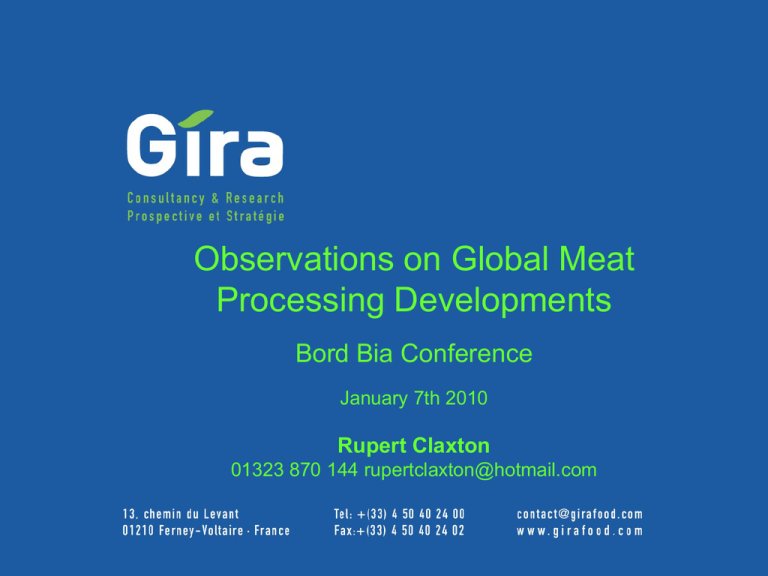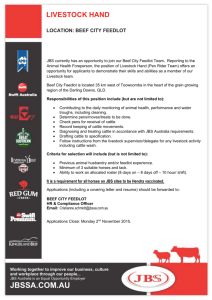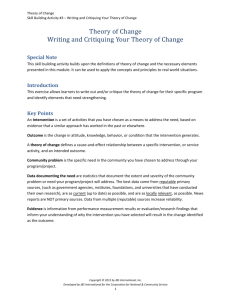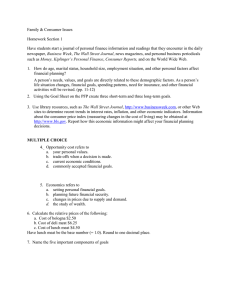Observations on Global Meat Processing Developments Bord Bia Conference Rupert Claxton
advertisement

Observations on Global Meat
Processing Developments
Bord Bia Conference
January 7th 2010
Rupert Claxton
01323 870 144 rupertclaxton@hotmail.com
Agenda
1. Key Global Companies
2. Brazilian Meat Multinationals
3. US Meat Giants
4. EU Meat Companies
The M&A stream paused briefly in 1H09, but has
started again … the BR at the forefront
Major Global Meat Processors
Approx primary processing volume '000t cwe
Next Ten
Yuron
Linyl Xincheng
Danish Crown
Bf
Pk
Py
Sh
Vion
BRF
Marfrig
Smithfield
Cargill
Tyson
JBS
Source: Gira
'09/10 volumes
adjusted for M&A
0
2000
Top 10 share
Next Ten share
4000
BF
23%
4%
6000
PK
14%
3%
8000
PY
13%
4%
10000
12000
SH TOTAL
1%
15%
0%
3%
Significant corporate developments amongst global
meat processors
US firms have traditionally been the biggest operators … but with a US
domestic market mindset, and commodity by-product exports
─ massive scale-advantage over RoW (in production & marketing)
• Large plants at high capacity utilisation
• Industry concentration per species
• Multi species operators
─ Smithfield was expansionist … until the last 2-3 years
• Vertical integration in pigmeat
• Global expansion … including Europe
─ Tyson is now more proactive outside the US … at last.
Brazilian meat processors have continued rapid M&A ... globally
─ Sadia and Perdigao led the poultry and pigmeat sectors
• Vertically integrated – grasping both agribusiness and consumer marketing opportunities
• Rapidly deepening and broadening their export portfolios … but troubled merger
─ JBS continued opportunistic M&A: massive, multi-origin, global sales reach
• Acquisition and organic: Brazil … UY, AR, US (multi-species), Australia … and Italy
─ Several other beef processors also attracted Stockmarket capital and have been
acquisitive e.g. Marfrig‟s acquisitions from OSI, Keystone … O‟Kane
─ 4Q08/09 global demand crisis catalysed new M&A wave
After a terrible year, BR share prices have
recovered … for those still independent
Source: Bovespa
Stock Market
Brazilian MeatCo Share Prices
33.0
2.7
30.0
2.4
27.0
2.1
24.0
1.5
15.0
1.2
12.0
0.9
9.0
0.6
6.0
JBS
SADIA
Perdigao / BRF
Marfrig
Minerva
Jul-10
Apr-10
Jan-10
Oct-09
Jul-09
Apr-09
Jan-09
Oct-08
Jul/08
Apr/08
Jan/08
Oct/07
Jul/07
Apr/07
Jan/07
0
Oct/06
0.0
Jul/06
0.3
Apr/06
3.0
Jan/06
USD
18.0
BRL/USD
1.8
21.0
BRL/USD
03/01/2011
03/10/2010
03/07/2010
03/04/2010
03/01/2010
03/10/2009
03/07/2009
03/04/2009
03/01/2009
03/10/2008
03/07/2008
03/04/2008
03/01/2008
03/10/2007
03/07/2007
03/04/2007
03/01/2007
03/10/2006
03/07/2006
03/04/2006
03/01/2006
03/10/2005
03/07/2005
03/04/2005
03/01/2005
US$/Share
Disappointing share price performance for the main US
corporates … facing (cyclical) profit challenges
US Meat companies Share Price - Jan 2005 to Jan 2011
50
40
Hormel
Smithfield
30
Tyson
JBS
20
Pilgrims
Pride
10
0
Source: Yahoo
Finance
Capital availability is a constraint primary processing
Meat processors less well funded: capital intensive, often low
margin, complex, and volatile: a specialist business, and risky for the
unprepared. Best case:
─ Large-scale, highly automated businesses – with lowest costs and with
good risk management (e.g. US, BR)
─ Further processed … and branded: better suited to Stockmarket
analysts (e.g. Nestle, Hormel) than primary processing
…external funding of primary processing is a challenge: especially
where overcapacity … or long industry tail
─ but selected „strategic‟ funders have catalysed huge change: Vion,
BNDES, oil derived sovereign wealth, etc
─ Farmer coops a good idea – in principle
Meat commodity trading: was well serviced, until the 4Q08 credit
crunch, but will slowly recover
Scale of commodity market speculation is problematic … excessive
volatility undermines industry hedging
Brazilian Meat Multinationals
JBS and Marfrig ambition knows no limit …but there
are clouds in the horizon
Top meat producers, 2009(e)
Total
production Annual production data ('000 tons cwe)
('000 tons
cwe)
PY
PK
BF
SH
JBS Brazil
3,175
3,175
Swift JBS USA
8,493
4,020
1,347
3,126
JBS Australia
751
601
150
JBS Argentina
100
100
Inalca JBS Italy (50% jv)
160
160
JBS Russia
10
10
Total JBS
12,689
4,020
1,347
7,172
150
Marfrig Brazil
Marfrig USA
Marfrig UK/Europe
Marfrig Argentina
Marfrig Uruguay
Marfrig Chile
Total Marfrig
Minerva
Sadia Brazil
Perdigao Brazil
Total BRF
2,072
360
265
307
375
4
3,383
241
1,074
360
265
1,699
-
399
399
-
241
6
57
4
68
1,206
1,317
2,523
86
86
-
-
-
Diplomata
243
243
-
-
-
Aurora - Coop
211
211
-
-
-
Doux-Frangosul
Source: Gira compilations
509
440
-
-
70
-
Ambition: BR agribusiness
opportunity … and profit
expectations
Drive for scale:
─ Selling power, and reach
─ Rationalisation benefits
─ Marketing opportunities
Multi-origin:
─ flexibility & risk reduction
─ Re-appraisal of country risk
39
39
Opportunism:
─ damaged balance sheets
─ creative bankers
-
1,630
1,690
3,320
Tyson
385
373
758
593
307
318
1,218
Multi-species: scale benefits &
risk reduction
Strategic support: BNDES
JBS US (and Marfrig UY SH) volumes seem too high, when compared to Gira‟s national derived data
JBS controlled by the Batista Family, with BNDES
support… to become the biggest global meat company
JBS - revenues allocation 2009 (%)
JBS capital structure
Controlling
holding (Batista
family)
56%
6%
13%
Beef
52%
Market
19%
Further processed
Pork
29%
Poultry
PROT-FIP
8.0%
BNDESPAR
17%
Source: company information
Source: company information
R$ mio
JBS
2006
Turnover
4,302
EBITDA
548
EBIDA/Turnover %
12.7%
Total Assets
3,464
Shareholders Equity
183
Gearing %
93.9%
Employees
19,230
Debt (ST & LT)
3,002
Short term
962
Long term
2,040
Source: company information
2007
14,142
602
4.3%
8,448
3,054
37.0%
48,497
4,849
3,484
1,365
2008
30,340
1,156
3.8%
16,096
6,134
20.3%
55,094
7,693
4,292
3,401
2009/08 2006-08
2009 chg %
pa chg %
55,224
82.0%
132.1%
3,058
164.5%
78.8%
5.5%
42,489
164.0%
126.3%
16,728
172.7%
315.5%
18.1%
123,936
125.0%
77.1%
20,416
165.4%
86.1%
7,797
81.7%
91.3%
12,619
271.0%
89.3%
• The Batista family is the main
shareholder with over half of the stock.
BNDES is the second largest
shareholder, and holds convertible
securities covering the PP acquisition
• Market cap ~ USD 10.7 bio, IPO‟d in
2007
• Revenues of about USD 30 bio
• 125,000 employees
• Went from beef–only operator to
multi protein
•The group slaughtered 3.7 mio cattle
over 3Q10, up 14.8% on 3Q09
10
From modest beginnings, JBS has built an impressive group
that has a market share of 13% of beef globally*…
Monthly
Monthly slaughter data
PY
('000 heads)
Annual production data ('000 tons cwe)
BF share slaughter
of kill (%)* (mio birds) PK
BF
SH
PY
PK
BF
SH
JBS material acquisitions only
JBS
4 Marcos + Torlim plants
Bertin/Vigor
JBS - Brazil (BF)
Take Country over
BR
1953
BR
2009
BR
2009
BR
Swift - Armour
Swift - Smithfield Beef Group
JBS-Swift & Co
Pilgrims Pride + Gold Kist (2007)
JBS- Swift & Co USA (BF)
AR
US
US
US
US
2005
2008
2007
2009
JBS - Inalca/Cremonini JV (50:50)
IT
2007
32
160
JBS Inalca/Marr Russia
RU
2009
n/a
10
Swift Australia (prior to acquisitions)
Swift - Tasman group
Swift - Tatiara Meat Company
Swift - Rockdale - pending approval
JBS Swift Australia (BF)
Total JBS group
Source: Gira compilations
AU
AU
AU
AU
AU
2008
2009
2010
22%
750
3,175
n/a
6.5%
14.6%
n/a
180
450
1,347
100
760
1,901
1,347
2,661
21%
n/a
180
180
15.8%
5.7%
1.2%
2%
25%
630
n/a
n/a
180
4,020
4,020
0
n/a
42
n/a
17
176
1,588
n/a
n/a
n/a
520
0
4,020
1,347
436
105
5
55
601
6,707
150
Emerging troubles: Inalca-Cremonini JV in Italy and JBS Argentina
* With consumption estimated at 51 mio tons cwe in 2010
11
Marfrig, with BNDES support, has also expanded hugely
through acquisitions
R$ mio
Marfrig capital structure
Market
32%
Capital group
5%
OSI group
6%
Source: company information
MMS particip
43%
BNDESPAR
14%
Marfrig
2007
Turnover
3,339
EBITDA
380
EBIDA/Turnover %
11.4%
Total Assets
12,514
Shareholders Equity
4,014
Gearing %
39.0%
Employees
19,648
Debt (ST & LT)
6,578
Short term
1,869
Long term
4,709
Source: company information
2008/07
2008 chg %
6,203
85.8%
884
132.6%
14.3%
25,899
107.0%
7,602
89.4%
46.8%
39,219
99.6%
14,286
117.2%
4,763
154.8%
9,523
102.2%
• Marcos Molina, founder is the main shareholder via a holding. BNDES is the 2nd largest shareholder, followed by OSI
Group
• Market value estimated at R$ 6.6 bio in 2009. Revenues of about R$ 10.3 bio in 2009. 73,000 employees in 2009 vs 39,000 in
08…close to a doubling of size within a year…
• Went from beef–only operator to multi protein player in a fortnight. Key acquisitions Seara (BR), Moy Park (UK/BR), Keystone
(US) – the Group made 37 acquisitions between 2007 and 2010 and gearing went up quickly, forcing Molina to declare a pause
• Marfrig operates 31 cattle slaughter plants (22 in BR, 5 in AR and 4 in UY), 33 industrialized & processed product plants (15 in
BR, 5 in AR, 3 in UY, 1 in the US and 9 in Europe) among others. Daily slaughter capacity is 30,200 cattle, 10,400 pork,
9,400 lamb, 30,000 turkey and 3.1 million chicken.
•A different business model to JBS, sees it acquiring better quality assets
12
The asset base of the company has been expanded at
impressive speed…so long as it can be managed
Take Marfrig (material
over
acquisitions)
Country
date
Marfrig + Mercosul/Margen
BR
2009
Mabella
BR
2007
Pena Branca
BR
Mar-08
Da Granja
BR
Mar-08
Seara Alimentos
BR
2009
Agrofrango
BR
2008
Penasul
BR
2008
Braslo Produtos de Carne
BR
2008
Doux - turkey unit
BR
2009
Marfrig - Brazil
BR
Estancia del Sur
AR
2007
Quickfood SA
AR
2007
Best Beef SA (Vivorata)
AR
2007
Argentine Breeders & Packers AR Subsidiary
Marfrig - Argentina
AR
Estab. Colonia/Quickfoods
UY
2007
Cledinor (la Caballada)
UY
2007
Inaler
UY
2007
Patagonia
UY
2007
Tacuarembo
UY
2007-09
Marfrig - Uruguay
UY
Frigorifico Patagonia
CL
2007
Marfrig - Chile
CL
Keystone
US
2010
Marfrig - USA
US
Moy Park - Dungannon
UK - NI
2008
O'Kane
NI/UK
2010
Marfrig - UK/EU
UK/EU
Total Marfrig group
Source: Gira from company information
Monthly
Monthly slaughter ('000
PY
heads)
Annual production ('000 tons cwe)
BF share slaughter
of kill
(mio
(%)*
birds)
PK
BF
SH
PY
PK
BF
SH
105
270
25
102
593
6
185
180
6
153
10
245
634
117
2
59
4
98
7.9%
0.6
24
290
42
1,231
399
0
0
0
70
50
85
75
0
0
0
0
25
114
0
0
70
318
0
280
21
21
0
0
0
0
0
0
0
0
0
290
0
504
0
326
0
360
360
250
15
265
1,856
57
4
4
0
0
0
11
11
35
0
399
0
1,218
0
68
270
20
58
25
18
121
46
24
19
25
593
51
148
64
45
307
129
66
52
6
0
14
10
17
15
13
BRF has the most open market structure of the top meat
companies in Brazil, but Share price has been erratic… at best
BRF shareholder structure
Brasil Foods Share Price
Banco Brasil pension fund
50
Petrobrás - pension fund
Sistel pensio fund
25
Sabia pension fund
Vale Do Rio Doce p. fund
03/01/2011
03/10/2010
03/07/2010
03/04/2010
03/01/2010
03/10/2009
03/07/2009
03/04/2009
03/01/2009
03/10/2008
03/07/2008
03/04/2008
03/01/2008
03/10/2007
03/07/2007
03/04/2007
03/01/2007
03/10/2006
03/07/2006
03/04/2006
03/01/2006
03/10/2005
03/07/2005
03/04/2005
0
03/01/2005
Price per Share (US$)
75
Shares in treasury
Market
R$ mio
Brasil Foods
2006
Turnover
6,106
EBITDA
456
EBIDA/Turnover %
7.5%
Total Assets
4,829
Shareholders Equity
2,105
Employees
39,048
Debt (ST & LT)
633
Source: company information
2007
7,789
803
10.3%
6,543
3,226
44,752
429
2008
13,161
1,159
8.8%
11,219
4,111
59,008
3,390
2009/08 2006-08
2009 chg %
pa chg %
24,426
85.6%
59.7%
1,222
5.4%
39.4%
5.0%
25,671
128.8%
74.2%
13,135
219.5%
77.5%
129,504
119.5%
47.3%
3,878
14.4%
111.8%
14
The BRF merger will set the stage for further
consolidation within Brazil...
Top Brazilian Pigmeat producers,
2009(e)
3500
Others
Top Brazilian Poultry meat producers,
2009(e)
Structure of the poultry industry - 2009e (kt cwe)
Frimesa
3000
('000 tcwe) .
Doux-Frangosul
2500
Riosulense
2000
Marfrig
BRF Brasil Foods
SA 2,599
Marbella
1500
Seara
1000
Alibem
Others 6,070
Marfrig 1,074
Aurora
500
Doux-Frangosul
440
Brasil foods
2008
2009 (e)
Source: Gira compilation
2007
2006
2005
2004
0
Aurora (coop) 211
Big Frango 141
Perdigao
Tyson 88
Sadia
Brazilian "frigorificos" - industry structure 2009/10
Company
JBS
Marfrig
Minerva
All others
Total
Source: Gira compilations
Diplomata 243
Eleva
Monthly
slaughter
('000
Share of
heads)
kill (%)
750
22%
270
8%
110
3%
2,440
67%
3,420
100%
Copacol (coop) 130
Frango Forte 104
Source: Gira compilations
C Vale (coop) 101
Pif Paf (Rio Branco)
95
15
What is driving this Brazilian M&A?
Opportunism: especially from JBS
─ damaged balance sheets
─ creative bankers
Ambition: BR agribusiness opportunity … and profit
expectations
Drive for scale:
─ Selling power, and reach
─ Rationalisation benefits
─ Marketing opportunities
Multi-origin:
─ flexibility & risk reduction
─ Re-appraisal of country risk
Multi-species: scale benefits & risk reduction
Strategic support: BNDES
─ Latest JBS rumours of US debt conversion to equity … and Sara
Lee
US Meat Giants
Cargill … well adapted to grow in positive long term
demand conditions, with managed risk, globally
CARGILL – global, strategic, agribiz. strength with
$100bn annualised sales, $2.5bn profit … and growth plans
Geographic – roll out
US
Global
Complimentary sectors
Trading
Grains
Farm supplies
Milling & crushing
Meats
Pk, Bf, Ch, Tu …
Biofuels
Animal feed
Slaughter
Industrial farms
Retail packing
Financial services
Branding
Steel
… but Cargill have substantially stopped investing in non-US meat interests!
Sold Seara Poultry division in Brazil… for a profit.
Big vertically integrated Meat Packers, have found
globalisation difficult
What is the Smithfield model? $9b sales and loss of $101m
─ Vertical integration from sow through to bacon
─ Said to offset the volatility of the markets
Reality…there is only so much revenue and profit in the chain
VI does not generate more revenue or profit from the market.
─ Benefits of integration come from efficiency, control…not from risk mgt.
Trying to rationalize its hog exposure…biggest challenge of the past two years
Hog farm reconfigurations, 2009 and 2010 consolidation and rationalization of many
assets and operating units.
Looking to drive integration efficiencies and grow packaged foods.
Tyson employs another model
─ …not right or wrong, just different
Sales of $28 billion and net profit of $780 million
Turn around from net loss of $547 million
Largest US beef producer, second largest US pork and chicken producer.
Growth has been focused on exports and expanded global presence.
“focused on creating innovative food solutions to market in the retail and foodservice
channels”….?
EU Meat Companies
The top EU primary processors are very large …and
active … but there is a (very) long industry tail
Top 10 EU 27 meat companies by meat production volume ('000 t cwe) - 2005/06
(updated for subsequent M&A)
HK Scan (FI) 77 245 61 383
Glon-Sanders (FR)
261
LDC (FR)
Doux Europe (FR)
125 386
453
453
550
550
Veronesi (IT) 79
510
589
Westfleisch (DE) 96
505
601
Tönnies (DE)
931
ABCS (FR)
624
448
Danish Crown (DK) 78
VION (incl GCFG) (NL)
931
1,072
1,812
477
1,890
1,903
500
1,000
1,500
200 2,580
2,000
Total meat production ('000 t cwe)
Source: Gira compilation and estimates
2,500
3,000
The EU‟s pig processing industry is concentrating,
mainly nationally, quite quickly … Vion forcing the pace
Others
TiCan
VION M&A stream with need
for subsequent restructuring
to achieve scale economies
Danish Crown
─
Others
Grampian
Others
Bowes of
Norfolk
Animex
Tönnies
Sokolow
Others
George Adams
and Sons
Cranswick
Country Foods
─
─
Tulip
Duda
VION
Danish Crown: live export,
UK & Se/Po/Dk investment
Increasing concentration
within most countries (cf. FR)
─
─
Lmeat Lukow
Source: Gira
Gausepohl
Cooperl
D&S
Westfleisch
Socopa
DE: overcapacity &
competitor reaction
NL >60% of pig kill: efficient
UK: GCFG restructure
Lower kill, cost pressure
Selectively X-border
Production by operator in the top 5 production countries ('000 t cwe) – 2005/06
Others
5000
Glon
Sanders
Primayor
Others
Vall
Companys Frimancha
Latest M&A (change to 06
sit‟n)
El Pozo
Batalle - Juia
Jorge
ABCS
VION acq‟d Grampian (UK)
Tulip (DC) acq‟d Adams
Cranswick acq‟d Bowes
ABC (FR) : Socopa (FR) merger
Primayor (ES) broken up
Groupe Smithfield / Campofrio
Net production ('000 t cwe)
Cecab
Other producers
N°5 producer
N°4 producer
N°3 producer
N°2 producer
Leader
4500
4000
3500
3000
2500
2000
1500
1000
Source:
500 Gira estimates
0
Germany
Spain
France
Poland
Denmark
The leading beef processors are „pulling away‟ from
the long „tail‟ of this traditionally fragmented industry
AIBP
Others
Grampian
Foyle
Dawn
VION
Others
Woodhead
Bros.
Westfleisch
Müller
Fleisch
Gausepohl
Färber
fragmented, nationally oriented industry,
with no genuinely multi-national players …
except JBS's stake in Inalca
VION M&A in DE catalyses concentration
… and reaction, and now UK (GCFG)
France has concentrated BF&V sector
with the new EU leader, ABCS
Long way to go in ES and IT
Industrial case ready, declining cattle
supply, imports & HD are the hot topics
Others
ABCS
Leaders' market share in the top 5 production countries ('000 t cwe) – 2005/06
Kerméné
1800
Other producers
SVA
Others
Inalca
NorteñosGypisa SAT Fribin
Unipeg
El Encinar
de Humienta
Others
MercaCarne
Viñals
Soler
Colomberotto
F.lli Schellino
Bugin
Net production ('000 t cwe)
Terrena
1600
Socopa
N°5 producer
N°4 producer
1400
N°3 producer
1200
N°2 producer
Leader
1000
800
600
400
200
0
France
Source: Gira estimates
Germany
Italy
United
Kingdom
Spain
Poultry industry concentration generally high within
each national market
Moy Park
Others
Grampian
Bernard
Matthews
2 Sisters
Others
PHW
Faccenda
Rothkötter
Others
Latest M&A (change to 06 sit‟n (data))
Heidemark
concentrated industry … but on a national
basis
In FR, IT and DE, the top 5 companies hold
more than ¾ of production
No multi-nationals present
VION acq‟d Grampian (UK)
Mafrig acq‟d Moy Park (UK, Fr)
Terrena (FR) acq‟d Unicopa (FR)
Stolle
Velisco
LDC
Production by operator in the top 5 production countries ('000 t cwe) – 2005/06
Glon
Other producers
N°5 producer
N°4 producer
N°3 producer
N°2 producer
Leader
2000
Others
Doux
Unicopa
Agricola
Berica
Fileni Simar
Sada
Others
Arena Fresh
COREN
Doux
Pavo y
Derivados
Uve
Amadori
1800
Aia (Veronesi)
GIP production ('000 t cwe)
Terrena
1600
1400
1200
1000
800
600
400
200
0
France
Source: Gira estimates
United
Kingdom
Germany
Italy
Spain
In NW Europe, more horizontal integration in the
future, and more specialisation in the supply chain
Future EU meat value chains
Pigmeat Beef & Lamb Broilers
Feed ingredients
Breeding
Feed compounding
Farming
Slaughter &
cutting
Further processing
Retail / Foodservice
Turkey
What next in the EU…
BR could have some EU primary processing M&A interests
─
─
─
─
─
─
─
─
Route to market: customer credibility and relationships
Product portfolio (domestic origin)
Profitable?
Risk reduction etc
Precedent from Marfrig in PY … for McDonalds
Precedent from JBS in 50% j/v with Inalca…
BRF already has FP acquisitions in EU
Attraction of continuous M&A stream
• So long as it can manage them
• … and what happens when the music stops
Further slow process of European consolidation
─ Vion?
─ The other major players?
─ Who pays? Who benefits?
• Currently plenty of issues to solve in EU industry, especially overcapacity
Thank You for your Attention
BACK-UP US Corporate Strategic Review:
Consolidation of gains and repairing the balance
sheet…lessons learned?
28
Much of the consolidation is to achieve better scale
and better capacity utilisation
'Optimal' primary processing plant size
per week
Broilers
Turkeys
Pigs
Cattle
Lambs
p.a
carcass Vol t.p.a. Many contradictions to the
'rule'
wt kg
1,000,000 50,000,000
2 100,000 Faccenda 2x this size, recent
Sun Valley acq'n 1/4
100,000 5,000,000
15
75,000 Depends of bird breed, sex
etc.
20,000 1,000,000
80
80,000 DC Horsens 4x, no Belgian
plant
2,000
100,000
325
32,500 Tonnies new plant 5x, ABP
'model' 1/2
30,000 1,500,000
20
30,000 Many smaller
Source: Gira estimates
The objective of size is scale economies … in everything:
Many different answers to optimal size, depending on:
─
─
─
─
Processing: depends on automation / technology, labour cost, standardisation
Marketing: meat: depends on customer demands. 5th Qtr: gains
Purchasing: depends on proximity & availability of livestock: reactions of others & intensity of local competition
Degree of forward integration
UK and European plants are much smaller than US
Australian processing: dynamic …, including
some global players, but still quite fragmented
Top 10 Australian Meat Companies, 1997
Rank 2007 Vol ext. '000t cwe
Ownership
JBS Swift Australia JBS
Beef
453
Tasman Group Services JBS
Rockdale Beef JBS
Tatiara JBS
JBS Group Total
Public - family
control
106
55
2
Teys Bros
345
3
Nippon Meat Packers Aust Nippon Meat
162
4
Cargill Beef Australia
Private. Cargill US
152
5
T&R Pastoral
Family
6
Fletcher International
Family
7
Australian Country Choice Family
60
8
9
H W Greenham
Kilcoy Pastoral
58
54
10
JSA Jackson
1
Family
Family
Singapore based
Fund
Family
Total Top 10
Australian GNP
2007
Share of Top 10
Sheep Pigs
614
53
58
5
39
97
5
80
82
1498
2180
50
309
692
69%
45%
5
Kill Primary Avg. Integration
BF
SH
share
Proc
plant
kill
kill
Bf+Sh
plants
size
share share
453
4
113 4x feedlot @ 100,000 one time
capacity total
169
6
28 1x mixed feedlot
55
1
55 1x feedlot
39
1
39 Primary and further processing
716 28% 14% 25%
12
60 Mainly backward integrated.
Some further processing + byproducts
345 16%
12%
4
86 1x feedlot @ 30,000 one time
capacity. 2x additional s/h
mothballed. Tannery. 2x FP
162 7%
6%
3
54 1x feedlot. Tanneries and byproducts
152 7%
5%
2
76 500,000 annual capacity. 1x
feedlot @ 17,000 one-time
capacity
133 2% 12% 5%
4
33 195,000 annual BF capacity, +
3.4m sheep capacity
82
12% 3%
2
41 Integrated farming, processing
& by-producut processing
60 3%
2%
1
60 530k ha breeding,
backgrounding & 2x feedlot.
Primary processing & RP
58 3%
2%
2
29
54 2%
2%
1
54
Total
Vol
50
7%
1812 69% 45%
2872
63%
Source: Gira, adjusting 2007 company organisation for recent M&A, based on MLA Feedback Supplement
2%
63%
2
33
25
55
By-products
Brazilian Producer Prices have increased sharply due
to domestic demand and export demand
Producer* price evolution in USD/kg dw, 2004-2010
R$/kg dw or cwe
7.00
6.50
IEA BF R$/kg dw farmgate
6.00
IEA PK R$/kg dw farmgate
IEA PY R$/kg cwe wholesale
5.50
5.00
4.50
4.00
3.50
3.00
2.50
2.00
1.50
1.00
0.50
Source: Gira from IEA
* Wholesale price is used for poultry
Oct-10
Jul-10
Apr-10
Jan-10
Oct-09
Jul-09
Apr-09
Jan-09
Oct-08
Jul-08
Apr-08
Jan-08
Oct-07
Jul-07
Apr-07
Jan-07
Oct-06
Jul-06
Apr-06
Jan-06
Oct-05
Jul-05
Apr-05
Jan-05
Oct-04
Jul-04
Apr-04
Jan-04
0.00
31
Cattle Producer Prices in EUR
Brazilian beef is not so internationally competitive any more
Cattle Producer Prices, 1999-2011 (Current EUR/t cwe)
3,500
3,000
2,500
EU Male beef R3
US
RU
BR
EU Cow
AU
UY
AR
2,000
1,500
1,000
500
2011
2010
2009
2008
2007
2006
2005
2004
2003
2002
2001
2000
1999
0
The mid-2010 drought has affected major pasture cattle
basins…exacerbating supply problems for the local
packers…
Source: IBGE Livestock
Municipal Production - 2004
33
A supply crisis strikes in 3/4Q10 and pushes prices to
historical levels unseen in 2008…while demand
remains quite strong
Beef balance, 1999-2011f
Brazilian Beef balance
('000 t cwe)
10 000
Production
Consumption
9 000
8 000
7 000
6 000
5 000
4 000
3 000
Exports
2 000
Production upward trend faster than herd growth
implies efficiency gains are the main driver
(slaughter age down, improvements in nutrition and
pasture management)
Production pulled by exports, but also by strong
domestic demand pulled by very strong economic
growth (+7.5%)
Cow retention still improving
Situation likely to remain dominated by tense supply
and high prices until year end; industry operates at low
cap usage
Draught may affect fertility, calving rate may slow down
1 000
Monthly producer prices (in LC and USD/kg)
1.5
2
1
IEA, Fat cattle price, R$/kg dw
1
Jul-10
Oct-10
Jan-10
Apr-10
Jul-09
Oct-09
Jan-09
Apr-09
Jul-08
Oct-08
Jan-08
Apr-08
Jul-07
Oct-07
Jan-07
Jul-06
0
0.5
IEA, Fat cattle price, USD/kg dw
Source: Gira from IEA
Apr-07
Politics
Disease
2
Oct-06
─
─
3
Jan-06
Bad relationships with farmers
Risk of market access problems
2.5
Apr-06
Current shortage of slaughter numbers
Aggravated by mid-2010 „drought‟
Hardly profitable: Some failures
JBS active in financing
AR situation is even worse
Jul-05
─
─
─
─
─
3
4
Oct-05
Processors running well below capacity
3.5
5
Jan-05
will encourage future production growth
… but reduces export competitiveness
4
6
Apr-05
─
─
4.5
Jul-04
Cattle price has risen substantially in BRL and USD
USD/kg dw
7
Oct-04
R$/kg dw
Jan-04
Source Gira compilations
Apr-04
2011f
2010f
2009
2008
2007
2006
2005
2004
2003
2002
2001
2000
1999
0
34
0




